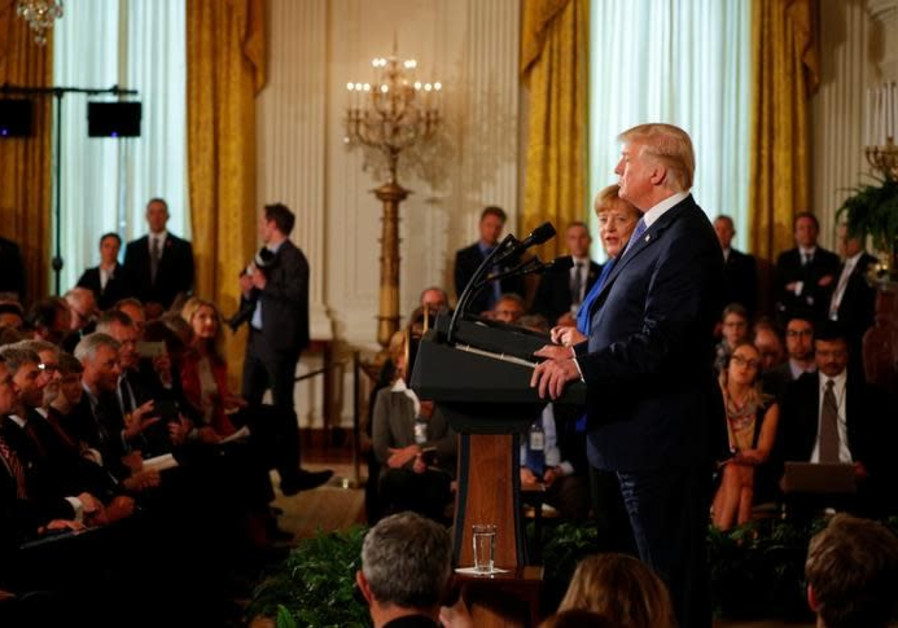Trump team offers Europe mixed signals on Iran deal

US President Donald Trump and Germany’s Chancellor Angela Merkel hold a joint news conference in the East Room of the White House in Washington, US, April 27, 2018. (photo credit: REUTERS/BRIAN SNYDER)
WASHINGTON — European leaders visiting Washington this week hoped for clarity on the fate of the Iran nuclear deal, now in Donald Trump’s hands. They received no such thing.
Trump told France’s President Emmanuel Macron at the White House on Tuesday that they were “close to understanding each other” on the 2015 pact, two weeks ahead of a decision by Trump whether to stick with it or withdraw. But Macron predicted Trump would choose the latter in a discussion with reporters the following day, noting he could not say with confidence which way he would go.
Germany’s Chancellor Angela Merkel, meanwhile, also said at the White House on Friday that the future of the deal was up to the American president. She adopted Macron’s newly sharpened rhetoric, characterizing the deal as “insufficient” and “far from perfect” — but she declined to outline precisely what Germany is willing to do to fix it.
Macron is leading a European effort to keep Trump in the deal by proposing a “bigger,” more comprehensive agreement: one that would not only address Iran’s short-term nuclear work, but also the size and efficiency of its nuclear infrastructure in the long-term, its ballistic missile work and, ambitiously, its power projection across the Middle East.
But the proposal is, by Macron’s own admission, a months-long endeavor — and would build on top of the existing nuclear deal, rather than replace it.
At this late hour in negotiations, it is still unclear whether Trump would be satisfied with add-ons to the existing nuclear deal, or if he needs the immediate gratification of a withdrawal — of scrapping the Obama-era effort and starting from scratch.
“We are not aiming to renegotiate the JCPOA (nuclear deal) or reopen it or change its terms,” Christopher Ford, the administration’s non-proliferation envoy, told reporters on the sidelines of a conference in Geneva on Wednesday. “We are seeking a supplemental agreement that would in some fashion layer upon it a series of additional rules — restrictions, terms, parameters, whatever you want to call it — that help answer these challenges more effectively.”
And yet, in Geneva on his first trip as secretary of state, Mike Pompeo suggested the opposite.
“There’s been no decision made. So the team is working, and I’m sure we’ll have lots of conversations to deliver what the president has made clear,” Pompeo said. “Absent a substantial fix, absent overcoming the shortcomings, the flaws of the deal, he is unlikely to stay in that deal past this May.”
Trump sees several major flaws in the agreement that must be somehow fixed in the next two weeks. He believes its failure to address Iran’s ballistic missiles — military vehicles designed to deliver nuclear warheads — is an unacceptable concession; that the agreement should address Iran’s general strategic posture in the region, which was the driving force of the nuclear program in the first place; that the expiration of several clauses in the deal will allow Iran to build its nuclear program over time to an industrial scale; and that UN inspectors should be granted snap access to Iran’s military sites.
That final condition requires reopening the agreement — a red line for all other parties to it, which include France, Germany, Britain, Russia, China, and Iran itself.
“I think the West has grown soft, has lost their political will and determination — and the deal with Iranians is something I cannot understand,” Israel’s defense minister Avigdor Liberman said on Friday at the Washington Institute for Near East Policy. He met at the White House with Trump’s national security adviser, John Bolton, to discuss the fate of the deal, and emerged from their talks confident the two see eye to eye.
But Trump’s defense secretary, James Mattis, who met Liberman later in the day, seemed to question the wisdom of hastily withdrawing from the nuclear accord in a Thursday congressional hearing.
Should they fail, Trump is threatening to withdraw the US from the agreement by reimposing nuclear-related sanctions on Iran lifted by the 2015 deal.
Mattis said that criticisms of the agreement are “valid,” but that, “obviously, aspects of the agreement that can be improved upon.” The position appeared in sync with that of Macron, who seeks improvements instead of revisions.
”I will say it is written almost with an assumption that Iran would try to cheat,”Mattis told the Senate panel. He said he had read the agreement in full several times, including its classified annexes.
“The verification, what is in there, is actually pretty robust as far as our intrusive ability to get in.”





Comments are closed.